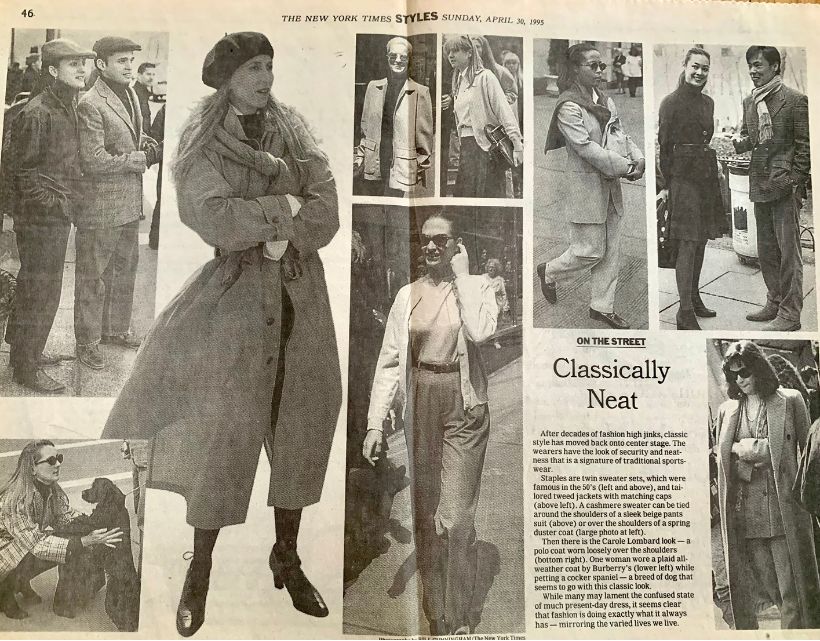In this picture, it’s me—arms crossed, wearing a beret—unknowingly photographed at the exit of the Fall/Winter 1995 fashion show in Bryant Park, New York.
The next day, I was flying back to Paris. Imagine my surprise when colleagues called to say, “You’re in today’s fashion section of The New York Times!”
What strikes me today is the title of the article. “Classically neat.” An incredibly accurate description of who I was at the time.
Here’s why.
Powerful fashion brands are defined by image. That image is not accidental—it is carefully coded, like a language. Every detail reinforces the narrative: product, advertising, media relations, retail design, events, social media, packaging… Everything must tell the same story.
The codes apply to the team. We dressed “Ralph Lauren.” We spoke “Ralph Lauren.” We breathed “Ralph Lauren.” We did it willingly, because the designer had created not just clothes, but a world—an aesthetic of cool elegance reflected in the company’s culture. Frankly, it was a beautiful world to belong to.
Being a Good Soldier — and Loving It
There is abundant literature about leadership. Much less about the value of being a good soldier.
At that stage of my career, being a soldier worked for me. I was immersed in an environment overflowing with opportunities to learn. As a PR Officer, I was exposed daily to journalists, creatives, executives, crises, deadlines. I absorbed knowledge like a sponge.
Was I demonstrating visionary leadership? Probably not. I was efficient, reliable, accountable—a busy bee determined to master the job quickly and thoroughly.
And it paid off.
An opportunity opened to lead PR for a department with a strong entrepreneurial dimension. The team was small, largely US-based, and required autonomy. My deep understanding of the brand’s codes and culture became a strategic advantage. I could embody the brand effortlessly.
When Mastery Becomes a Limit
A few years later, something shifted.
New collaborators arrived from other fashion and luxury houses. They brought fresh perspectives, new marketing strategies, innovative approaches to storytelling. As I listened, I felt a subtle tension inside me. Part of me resisted: This is not how we do things here. Another part was intrigued: That’s actually brilliant.
I realized I had become a guardian of the codes. I knew how to execute them perfectly. But I was no longer questioning them.
My references were solid—but narrow.
I was on the wrong side of innovation.
Marshall Goldsmith famously said, “What got you here won’t get you there.” The habits, reflexes, and strengths that helped me thrive in one chapter were not the ones that would help me grow in the next.
And this is the quiet trap of early success: you start confusing excellence with permanence.
Time to Break the Frame
That New York Times photo captured more than a look. It captured an identity. “Classically neat” was not only about style—it was about alignment, discipline, belonging.
But growth requires expansion.
There is a time to be the good soldier. A time to master the codes. A time to absorb and execute.
And there is a time to step back and ask:
Am I still learning?
Am I still expanding?
Or am I protecting what I already know?
Comfort is seductive, especially when it looks like success.
But evolution demands curiosity. It demands the courage to question the very system that once elevated you. It demands stepping out of the frame—even when you look perfectly composed inside it.
Looking at that picture today, I feel gratitude. That version of me was exactly who I needed to be at that time.
But she was not meant to stay there.
And neither are you.


 Alexandra Humbel Coaching
Alexandra Humbel Coaching